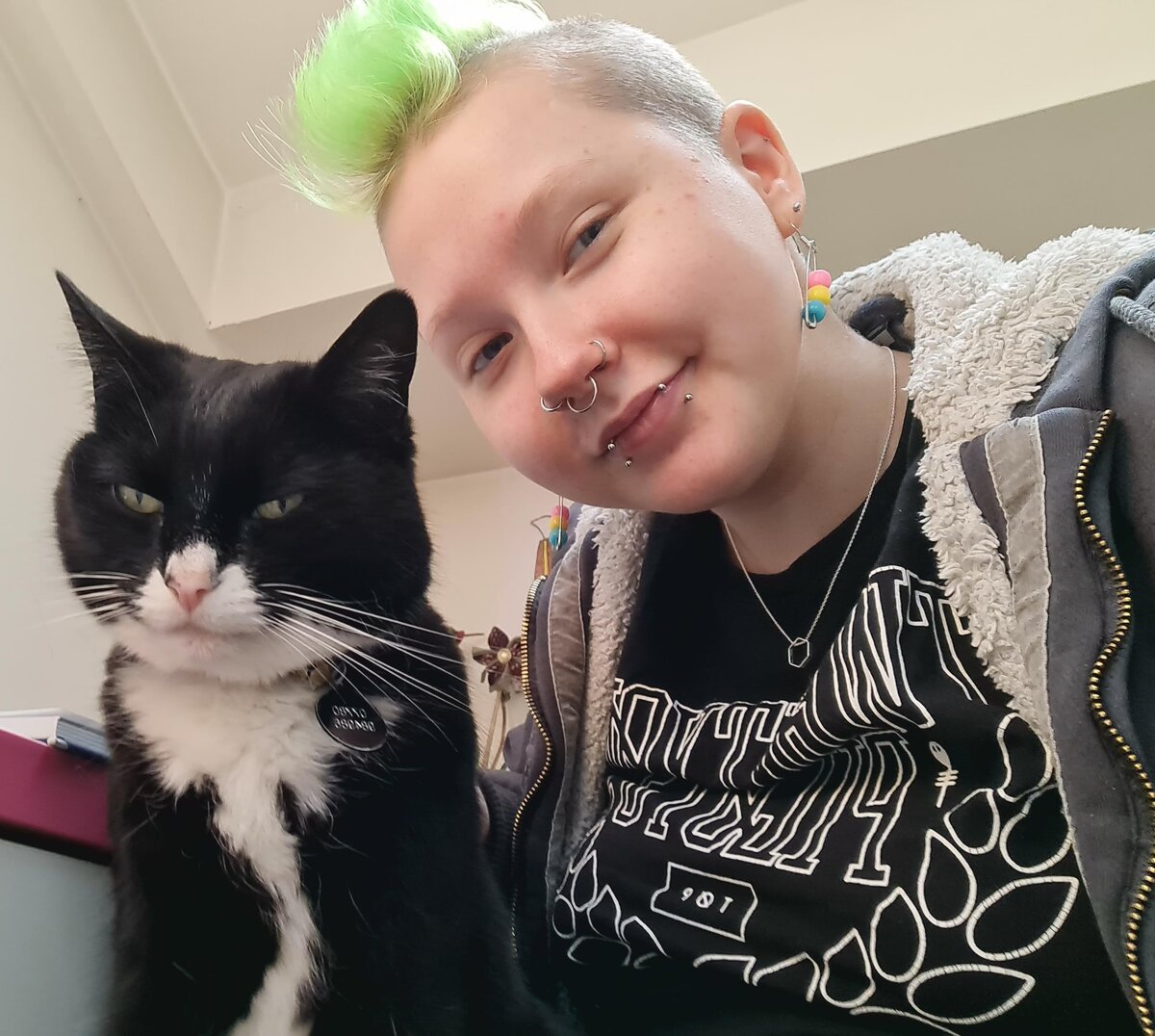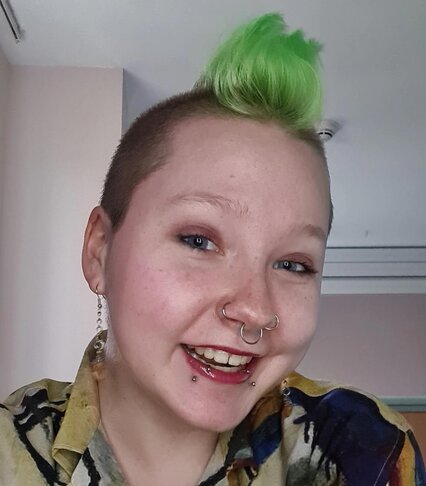
“There doesn't seem to be a lot of understanding that there isn't one look for autism. Everyone is going to be different because we are different people.”
Maya - on celebrating Pride Month and being part of the LGBTQ+ community
To celebrate Pride Month, we spoke to Maya Stretton, one of the National Autistic Society’s Young Ambassadors. Maya reflects on their experiences of being part of the LGBTQ+ community, how they’re fighting for change for autistic people as a Young Ambassador, and why autistic representation in the LGBTQ+ community is so important.
When did you first know or start to think you were autistic?
My parents and I never thought that I was autistic growing up because I was not a cishet [a person who is cisgender and heterosexual] white guy who's either a genius or nonverbal, so I didn't fit the stereotype of autism. We didn't end up pursuing a diagnosis until I started having health issues in 2019, and I got my diagnosis at the start of 2021.
After having my diagnosis, my mental wellbeing was massively improved. But all throughout my childhood, we never even considered that I could be autistic because of how AFAB [assigned female at birth] people are socialised.
What is being autistic like for you? What impact has it had on your life?
I think it's wonderful, but it can also be exasperating and exhausting in ways. Being autistic has created who I am: it's my identity, it’s how my brain works, it’s how I function as a person. It's also the reason why I'm doing my degree, because being autistic meant I had hyperfixations and special interests. I was so passionate about a sense of justice as well, which is why I joined the National Autistic Society’s Young Ambassadors group.
What has your experience as an autistic person in the LGBTQ+ community been like?
My experience has mostly been very accepting. The LGBTQ+ community is generally filled with people who haven't been that accepted in previous situations, who have been put in that ‘other’ category. In my experience, the LGBTQ+ community seems to be more welcoming to neurodivergent people because they understand what it is to be the outcast. Because everyone in the LGBTQ+ community has their own story and their own experiences of living differently to a neurotypical, cishet person, it opens up so many different conversations.
How do you usually celebrate Pride and what do you enjoy most about it?
I generally do go to Pride parades, but because I'm autistic, it can be very overwhelming. And with other health problems I've had, I've ended up going less frequently now than I used to. But I love the community of Pride and the acceptance. It's just a wonderful celebration to have.
What inspired you to join our Young Ambassadors group, and what challenges do you think autistic young people currently face?
I did a lot of advocacy work in my high school, and I really enjoyed feeling like I was actively changing perspectives. I felt it was important to make sure people know it's okay to be themselves, that all diversity is wonderful and all people are incredible.
I think the main challenge that autistic young people currently face is not being understood, being in a society that doesn't understand and a lot of the time, doesn't strive to understand. Often, when you ask for accommodations, people say: “Well, you wouldn't get this in the real world.” Well, why not? Why can't the real world be better and more accepting of neurodivergent people? Why do we have to pick the short straw? We can always make change. And that's why I wanted to join the Young Ambassadors.
You recently gave evidence to the Women and Equalities Select Committee about misdiagnosis in autistic women and girls. Could you tell us a bit about why this issue is so important to you?
When I was in high school, the counsellor told me that I had OCD. But it wasn't OCD: it was me being autistic and having coping strategies. So in trying to cure the OCD, it was taking away strategies that were very helpful and beneficial for me. I think that lots of people have similar stories where, because they've been masking their whole lives, they're more prone to misdiagnosis.
I was almost 17 when I got diagnosed, but there are people in their fifties and sixties who are only now getting diagnosed because there was a lack of understanding of autism when they were younger. I think people should be able to get as much support as possible, but a lot of the time that support is behind the doors of diagnosis.
You’re currently studying psychology at university. What motivated you to study psychology, and what advice would you give to other autistic people looking to study the subject at university?
What motivated me to study psychology was the fact I have functional neurological disorder (FND). I wanted to know more about myself and help other people. I got my autism diagnosis because of my FND diagnosis. The doctors were looking into the root cause of my FND, and they found that I was having seizures because I couldn't identify my own emotions; my anxiety was causing physical symptoms and having negative effects on my health.
The advice I’d give to other autistic people looking to study psychology at university is to go for it and get stuck in. If people are studying psychology, it’s because they're interested in the brain and they're not going to care if you're neurodivergent; they're going to think that's incredible because your brain works in a different way from them. It's a field I feel completely welcome in, and one that will be open to accommodations because psychologists understand how individual differences work.
Why do you think the representation of autistic people in the LGBTQ+ community is so important?
We need more autistic representation in all communities: we need more BIPOC (Black, Indigenous and People Of Colour) representation; we need more LGBTQ+ representation; we need to see different ages represented as well. There doesn't seem to be a lot of understanding that there isn't one look for autism. Everyone is going to be different because we are different people.
There's a show on Netflix called Heartbreak High that has a character called Quinni, played by Chloé Hayden, who is autistic, ADHD and plays an LGBTQ+ character. And it made me so incredibly happy to see because it put being autistic into the context of: “This is my experience of being autistic, and it may be different than how you assume it's going to be.” There was one part where she went on a date, and it was all really overwhelming, and she ended up telling the person afterwards: “I'm autistic. It wasn't that I wasn't interested, it's that there was so much going on – I just need adjustments.” And eventually you see her girlfriend adapting to what works for her. These experiences should be happening in real life, but a lot of times people just aren't willing to make those changes.
What needs to change for Pride to become more inclusive for autistic members of the LGBTQ+ community?
When you have autistic people involved in creating Pride events, you will end up with these events being better targeted for them because you're more considerate of their needs. I think it's got to be in the system, having more autistic people involved and taking on more of their advice. A lot of Pride-related things are now online, and I think that's also a big inclusive change for autistic people.
I try to look after the things that I can control, so I'll bring noise cancelling headphones and I'll try and make sure I'm not in the busiest spots. A lot of the accessibility issues I've had with Pride have been more about mobility rather than autism, because Pride is more accommodating to able-bodied people.
"I think it's also about knowing yourself, preparing beforehand, being aware of what you can do. Things can be very loud and overwhelming, but there's usually places where you can go and have a break."

What is one thing you wish more people got right about autism?
Autism doesn't have one look. Everyone is different, and that applies to autistic people as well as neurotypical people.
Another main thing is accommodations aren't a plus or an added bonus: they’re what we need for a level playing field. A lot of the times you hear about the ‘autistic tax’ of having to pay more to make accommodations. For example, if a train or a bus will be too overwhelming, having to pay for a taxi to get to appointments, or avoiding certain areas because of large loud events and things like that. Being autistic, it costs more emotionally, physically and financially. It's helpful to have consideration from other people, having people actively try to create a society that works better for autistic people.
Find out more:
- Connect with other autistic people from the LGBTQ+ community through our LGBTQ+ online branch.
- Meet some of our other Young Ambassadors.
- Read more Stories from the Spectrum here.
